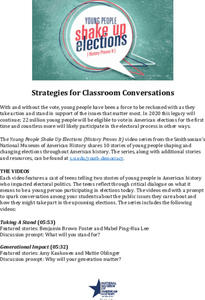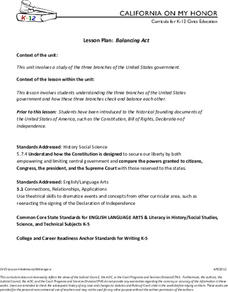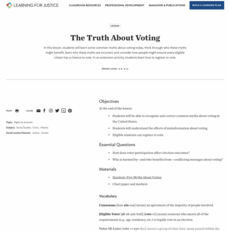DocsTeach
The Civil Rights Act of 1964 and the Equal Employment Opportunity Commission
1964: A victory for the civil rights movement! Scholars read a section of the Civil Rights Act of 1964 and discuss what affirmative actions means to them. The resource is a jigsaw activity, with each group focusing on one section of the...
DocsTeach
Analyzing a Letter About American Indian Voting Rights
An informative activity focuses on the law preventing Native Americans from voting until 1947. Scholars read documents from the Office of Indian Affairs, complete an online worksheet, and participate in group discussion. Academics learn...
Center for History Education
The Founding Fathers and the Constitutional Struggle Over Centralized Power
Believe it or not, the Constitution was America's second attempt at a democratic government. Academics travel back to the past to explore the shortcomings of the Articles of Confederation that would eventually lead to the Constitutional...
Center for History Education
Democratic Ideas of the 1776 Maryland Constitution
1776 was a year of political upheaval in the American colonies. Academics examine the Maryland Constitution to understand the desire to break with Great Britain. Young historians learn about Maryland's efforts to extend rights to its...
Smithsonian Institution
Young People Shake Up Elections (History Proves It) Educator Guide
Vote, it's your civic duty! The resource provides several videos about voting in the United States. Scholars watch a series of topics ranging from youth participation to civic action. The educator's guide provides teachers with...
Judicial Branch of California
Balancing Act: The Three Branches
What do hula hoops and the American system of government have in common? Using hands-on station activities, pupils consider the roles of the three branches of government. A script for teachers and writing prompts help round out a...
Museum of the American Revolution
Hamilton Was Here: Rising Up in Revolutionary Philadelphia
Hamilton may be a hit Broadway show, but there is so much more to learn. An eight-unit resource guides young historians through the life of Alexander Hamilton and the Revolutionary War. The lessons include hands-on-activities, writing,...
DocsTeach
The New Deal: Revolution or Reform?
Scholars weigh in on FDR's New Deal policies in an in-depth activity. The resource uses historical documents to explore whether the New Deal polices were reformatory or revolutionary. Learners review documents, rate them using a scale,...
DocsTeach
Election of 1800
The 2020 election is not the only unpredictable one in history. The Election of 1800 highlighted an unforeseen event in a presidential election. The activity reviews documents from the elections and what happened when the electoral...
Teaching Tolerance
The True History of Voting Rights
Explore what voting rights really are in an intriguing lesson plan that explores the history of American voting. The resource examines the timeline of voting rights in the United States with group discussions, hands-on-activities, and...
Teaching Tolerance
The Truth About Voting
True or False: Only Presidential elections matter. Academics delve into common voting myths to understand what is true and why the election process is critical to democracy. The lesson uses group discussion, activities, and handouts to...
National Endowment for the Humanities
The Power of the Majority over Thought
While Alexis de Tocqueville mourned a lack of "freedom of discussion" in America in the early republic, today's pupils are concerned about peer pressure. Using excerpts of de Tocqueville's writing and discussion questions, scholars...
National Endowment for the Humanities
The Tyranny of the Majority
In American democracy, majority rules but what prevents the voices of the few from being crushed? Using excerpts from Alexis de Tocqueville's writings, young historians explore cases where minority rights were trampled upon. Extension...
National Endowment for the Humanities
The Omnipotence of the Majority
While the American system is based on the idea of almost-universal suffrage for adults, great thinkers have had concerns about this system of governance. Using classic writings from Alexis de Tocqueville and videos highlighting thinkers...
Teaching Tolerance
Why Local Elections Matter
Uncle Sam wants everyone to vote in local elections! Geared toward middle and high school scholars, the resource explores voter turnout and the importance of local elections. Academics participate in group discussion, complete...
Facing History and Ourselves
Literature and Imagination Make Democracy Work
The final lesson in the "What Makes Democracy Work?" series examines the connections between imagination, literature, and democracy. Class members listen to a podcast, read an excerpt from Azar Nafisi's, The Republic of Imagination, and...
Facing History and Ourselves
Reflection and Action for Civic Participation
Slacktivist or activist? Bystander or upstander? Positive social change requires involvement and commitment. After reading a series of articles about young people who chose to get involved, scholars examine a framework that helps peers...
Facing History and Ourselves
Responding to Difference in Democracy
Disagreements happen in a diverse democracy. It's what people do about these differences in a diverse society that the resource models. After listening to an eight-minute podcast about a woman who collaborated with people who have very...
Facing History and Ourselves
Taking Ownership of the Law
The work of building and maintaining a democracy is, in the words of Justice William Hastie, "never finished." To better understand what Hastie sees as an ongoing building process, class members listen to a seven-minute podcast about two...
Facing History and Ourselves
Insights on Democracy from South Africa
As part of their study of democracy, high schoolers listen to a podcast featuring two South African educators and their efforts to support the process of transforming the nation from apartheid rule into a democracy. Learners also read...
Facing History and Ourselves
Citizen Power Makes Democracy Work
Eric Liu's formula "power plus character equals citizenship" and his three strategies to making change happen model for high schoolers how to develop citizen power, how to get involved and participate to make democracy work. Class...
Facing History and Ourselves
Defining Democracy
For democracies, it is both the best and the worst of times. As part of a study of the challenges facing democracies, young political scientists seek first to define democracy, and then to consider the relationship between democracy and...
Facing History and Ourselves
The Legacies of Reconstruction
The final lesson in the seven-resource Reconstruction Era collection examines the legacies of Reconstruction. Class members investigate why the period has been called an "unfinished revolution," "a splendid failure," and "the second...
Facing History and Ourselves
Interracial Democracy
Radical Reconstruction, the 10-year period referred to after Congress passed the Reconstruction Act of 1867, saw the establishment of manhood suffrage, men voting without any racial qualifications. Southern states also rewrote their...

























